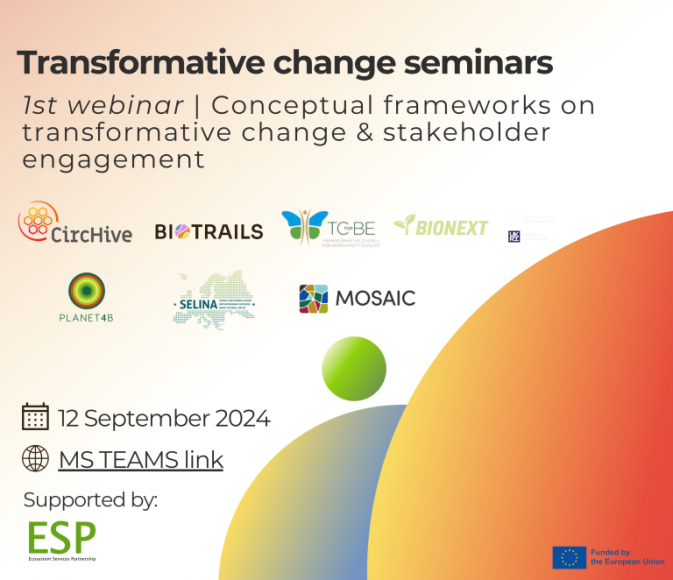SELINA and its Communities of Practice introduced at the 1st Transformative Change webinar
On 12 September 2024, the first webinar in the Transformative Change Seminar series was held, as part of a collaborative effort by seven Horizon Europe projects within the Transformative Change cluster. The goal of the series is to foster collaborative learning, enhance synergies between concepts and methodologies, co-create adaptive solutions and tools, and share experiences.
The webinar, titled "Conceptual Frameworks on Transformative Change and Stakeholder Engagement," was hosted as part of the ESP Education and Training series. Presentations were given by representatives from the BIOTRAILS, SELINA, PLANET4b, and BIONEXT Horizon Europe projects. The online event attracted over 100 participants online, including professionals, researchers, policymakers, and individuals interested in transformative change for biodiversity, stakeholder engagement, and related initiatives.
SELINA was represented by Inge Liekens from VITO, which is one of the project's partners. She presented SELINA’s collaborative approach, which includes:
- The use of 15 Demonstration Projects
- The establishment of Communities of Practice (CoPs) in all EU member states to facilitate dialogue between scientists, policymakers, businesses, societal organisations, and other key stakeholders
- The co-creation of a Compendium of Guidance with these stakeholders
Currently, 20 SELINA CoPs have been established and are operational. Inge Liekens explained how SELINA aims to make these CoPs more transformative by:
- Involving a broader range of participants, including unexpected biodiversity stakeholders like planners, landowners, and artists.
- Engaging individuals who seek change and can transcend disciplinary boundaries.
- Shifting the CoPs' focus to uncovering underlying patterns and values in complex issues, prioritising doing things differently over simply improving current practices.
- Creating safe spaces for knowledge sharing and collective learning, where participants can develop new skills to apply in their daily work.
- Identifying and amplifying best practices (“Seeds of Change”) where integrating biodiversity, ecosystem condition, and ecosystem services knowledge has made a significant impact.
The next webinar in the series is scheduled for February 2025 and will discuss the methodologies for mapping system interactions.
